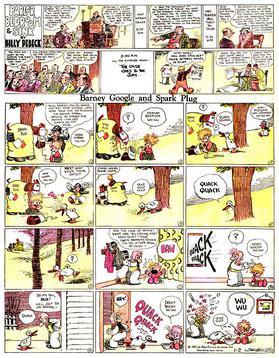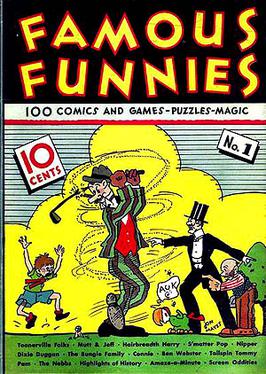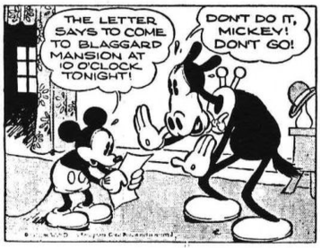A comic strip is a sequence of cartoons, arranged in interrelated panels to display brief humor or form a narrative, often serialized, with text in balloons and captions. Traditionally, throughout the 20th and into the 21st century, these have been published in newspapers and magazines, with daily horizontal strips printed in black-and-white in newspapers, while Sunday papers offered longer sequences in special color comics sections. With the advent of the internet, online comic strips began to appear as webcomics.

Arthur Floyd Gottfredson was an American cartoonist best known for his defining work on the Mickey Mouse comic strip, which he worked on from 1930 until his retirement in 1975. His contribution to Mickey Mouse comics is comparable to Carl Barks's on the Donald Duck comics. 17 years after his death, his memory was honored with the Disney Legends award in 2003 and induction into the Comic Book Hall of Fame in 2006.
FoxTrot is an American comic strip written and illustrated by Bill Amend. The strip launched on April 10, 1988, and it originally ran seven days a week. From December 31, 2006 onwards, FoxTrot has only appeared on Sundays.

An American comic book is a thin periodical originating in the United States, on average 32 pages, containing comics. While the form originated in 1933, American comic books first gained popularity after the 1938 publication of Action Comics, which included the debut of the superhero Superman. This was followed by a superhero boom that lasted until the end of World War II. After the war, while superheroes were marginalized, the comic book industry rapidly expanded and genres such as horror, crime, science fiction and romance became popular. The 1950s saw a gradual decline, due to a shift away from print media in the wake of television and the impact of the Comics Code Authority. The late 1950s and the 1960s saw a superhero revival and superheroes remained the dominant character archetype throughout the late 20th century into the 21st century.

Tankōbon is a Japanese word recently borrowed into English. Its use in English refers to a collection of episodes of a cartoon that first appeared in weekly or monthly manga comic books. Manga books in Japan are usually thick printed on lightweight, cheap paper. The cartoons in them are usually continuing stories. A tankōbon is a collection of episodes of one of those cartoons as a book. Additional tankōbon volumes are printed as the series continues.

Raw was a comics anthology edited by Art Spiegelman and Françoise Mouly and published in the United States by Mouly from 1980 to 1991. It was a flagship publication of the 1980s alternative comics movement, serving as a more intellectual counterpoint to Robert Crumb's visceral Weirdo, which followed squarely in the underground tradition of Zap and Arcade. Along with the more genre-oriented Heavy Metal it was also one of the main venues for European comics in the United States in its day.
A daily strip is a newspaper comic strip format, appearing on weekdays, Monday through Saturday, as contrasted with a Sunday strip, which typically only appears on Sundays. They typically are smaller, 3–4 grids compared to the full page Sunday strip and are black and white.
Shary Flenniken is an American editor-writer-illustrator and underground cartoonist. After joining the burgeoning underground comics movement in the early 1970s, she became a prominent contributor to National Lampoon and was one of the editors of the magazine for two years.

The Sunday comics or Sunday strip is the comic strip section carried in most Western newspapers. Compared to weekday comics, Sunday comics tend to be full pages and are in color. Many newspaper readers called this section the Sunday funnies, the funny papers or simply the funnies.

Krazy Kat is an American newspaper comic strip, created by cartoonist George Herriman, which ran from 1913 to 1944. It first appeared in the New York Evening Journal, whose owner, William Randolph Hearst, was a major booster for the strip throughout its run. The characters had been introduced previously in a side strip with Herriman's earlier creation, The Dingbat Family, after earlier appearances in the Herriman comic strip Baron Bean. The phrase "Krazy Kat" originated there, said by the mouse by way of describing the cat. Set in a dreamlike portrayal of Herriman's vacation home of Coconino County, Arizona, KrazyKat's mixture of offbeat surrealism, innocent playfulness and poetic, idiosyncratic language has made it a favorite of comics aficionados and art critics for more than 80 years.
The Eastern Color Printing Company was a company that published comic books, beginning in 1933. At first, it was only newspaper comic strip reprints, but later on, original material was published. Eastern Color Printing was incorporated in 1928, and soon became successful by printing color newspaper sections for several New England and New York papers. Eastern is most notable for its production of Funnies on Parade and Famous Funnies, two publications that gave birth to the American comic book industry.

Australian comics have been published since 1908 and Australian comics creators have gone to produce influential work in the global comics industry,
Comic strip formats vary widely from publication to publication, so that the same newspaper comic strip may appear in a half-dozen different formats with different numbers of panels, different sizes of panels and different arrangement of panels.

Famous Funnies is an American comic strip anthology series published from 1934 to 1955 with two precursor one-shots appearing in 1933–1934. Published by Eastern Color Printing, Famous Funnies is considered by popular culture historians as the first true American comic book, following seminal precursors.
Garfield merchadise is the merchandise based on the "Garfield" comic strip by Jim Davis. Garfield is one of the world's most prominent and widely syndicated comic strips, and was specifically designed to be marketable. Before the sale of Paws, Inc. in August 2019, all the profits from merchandise went to Paws, Inc., of which Jim Davis is the CEO and founder. The following is a compiled list of selected merchandise based on the franchise.
The Sunday Funnies is a publication reprinting vintage Sunday comic strips at a large size (16"x22") in color. The format is similar to that traditionally used by newspapers to publish color comics, yet instead of newsprint, it is printed on a quality, non-glossy, 60-pound offset stock for clarity and longevity. Featured are classic American comic strips from the late 19th century to the 1930s. The publication's title is taken from the generic label often used for the color comics sections of Sunday newspapers.
Prince Valiant is a series of hardcover books, published by Fantagraphics Books, that collects the Prince Valiant comic strip, written and drawn by Hal Foster. The release of the series began in August 2009.
Superman: The Complete Comic Strips 1939-1966 is an unofficial umbrella name for the six following titles: Superman: The Golden Age Dailies, Superman: The Golden Age Sundays; Superman: The Atomic Age Dailies, Superman: The Atomic Age Sundays; Superman: The Silver Age Dailies and Superman: The Silver Age Sundays, all published by The Library of American Comics. These six series of books collects the complete run of the American comic strip Superman by DC Comics, which was originally distributed in newspapers by the McClure Syndicate between 1939 and 1966.

Mickey Mouse is an American newspaper comic strip by the Walt Disney Company featuring Mickey Mouse and is the first published example of Disney comics. The strip debuted on January 13, 1930, and ran until July 29, 1995. It was syndicated by King Features Syndicate.
Sunday Press Books is an American publisher of comic strip reprint collections founded in 2005 by Peter Maresca. The company is known as a respected reprinter of comic strips and has to date won three Eisner Awards and two Harvey Awards. Since 2022 the company is partnered with Fantagraphics in distribution and marketing.